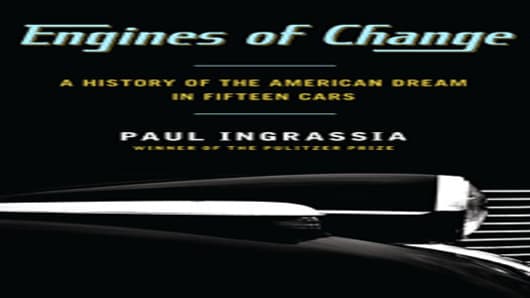GUEST AUTHOR BLOG by Paul Ingrassia author of "Engines of Change: A History of the American Dream in Fifteen Cars."
It might seem quaint or outmoded — in this era of iPads, cell phones, apps and tweets — to write about the cars that helped to shape American life and thought.
But think about it.
The Beach Boys had a 1963 hit song about a drag race called “Shut Down.” But nobody has yet recorded a song called “Download.” Wilson Pickett’s “Mustang Sally” was about a car, not a horse. Many people had their first sexual adventure in a car, but very few had that experience in a computer.
Maybe that will be next year’s killer app.
I’ve covered the automobile industry as a journalist for much of the last 25 years.
That’s a long time to write about a single subject, but automobiles are multi-faceted.
They can be vehicles (pardon the pun) for exploring virtually any major topic affecting, or afflicting, our society: the environment, urban development, globalization, trade, technology, design, labor relations, manufacturing and more. The intersection of cars and culture is one of the busiest crossroads in America.
Nothing captured the boundless optimism of America’s peacetime post-war prosperity as much as tail fins. The Volkswagen Beetle’s evolution from Hitler’s car to hippie icon is perhaps history’s most unlikely journey. The Beetle’s first cousin, the VW bus, hosted frequent acts of vehicular herbicide. In the course of my research I found people who drove Beetles and buses in the 1960s and then turned to BMWs in the 1980s. Their personal and automotive journeys were intertwined: Beetle to Bimmer, and hippie to yuppie. I learned that Steve Wozniak, beloved geek guru and co-founder of Apple Computer , owns and drives both a Toyota Prius and a Hummer SUV, which is sort of like owning both a Mac and a PC.
"Nothing captured the boundless optimism of America’s peacetime post-war prosperity as much as tail fins."
Some cars were potent social or political symbols.
After the Chrysler minivan became the unofficial vehicle of the “soccer mom,” the company considered doing a TV commercial showing an embryonic minivan growing inside a mother’s womb. Fortunately, the idea was, um, aborted. Meanwhile, Massachussets Republican Scott Brown won a U.S. Senate seat in 2010 by campaigning around the state in a pickup truck. Months later, a Tennessee candidate for Congress billed himself as a “truck-driving, shotgun-shooting, Bible-reading, crime-fighting, family loving country boy.” The candidate happened to be a Democrat.
Writing "Engines of Change" also gave me a chance to revisit some automotive literary classics. In "On the Road," Jack Kerouac went searching for himself. In "Travels with Charley," John Steinbeck went searching for America. In "Republican Party Reptile," P.J. O’Rourke went searching for beer. The great American road trip was always about searching for something meaningful...more or less.
My research included driving Priuses (Prii?) in Michigan, Jeeps through Colorado and pickup trucks through the Texas Hill Country and Midtown Manhattan, feeling right at home in the former and like an alien invader in the latter. I went to Copenhagen for a weekend road rally with the Cadillac Club of Denmark, whose members worship 1950s tail fins as sacred relics of the America they learned about as kids.
The centennial celebration for the Model T Ford, held in Indiana in 2008, was especially memorable. One attendee had driven his Model T from “UCLA,” which he explained meant the “Upper Corner of Lower Alabama.” His hometown there happened to be Monroeville, also the home of the reclusive Harper Lee, author of "To Kill a Mockingbird." It was a book that, like the Model T and the other cars in this book, helped to reshape American life and thought.
Paul Ingrassia is the former Detroit bureau chief for The Wall Street Journal and the author of "Engines of Change: A History of the American Dream in Fifteen Cars." Winner of the Pulitzer Prize in 1993 (with Joseph B. White) for reporting on management crises at General Motors, Ingrassia has chronicled the auto industry for more than twenty-five years.
Email me at bullishonbooks@cnbc.com — And follow me on Twitter @BullishonBooks


